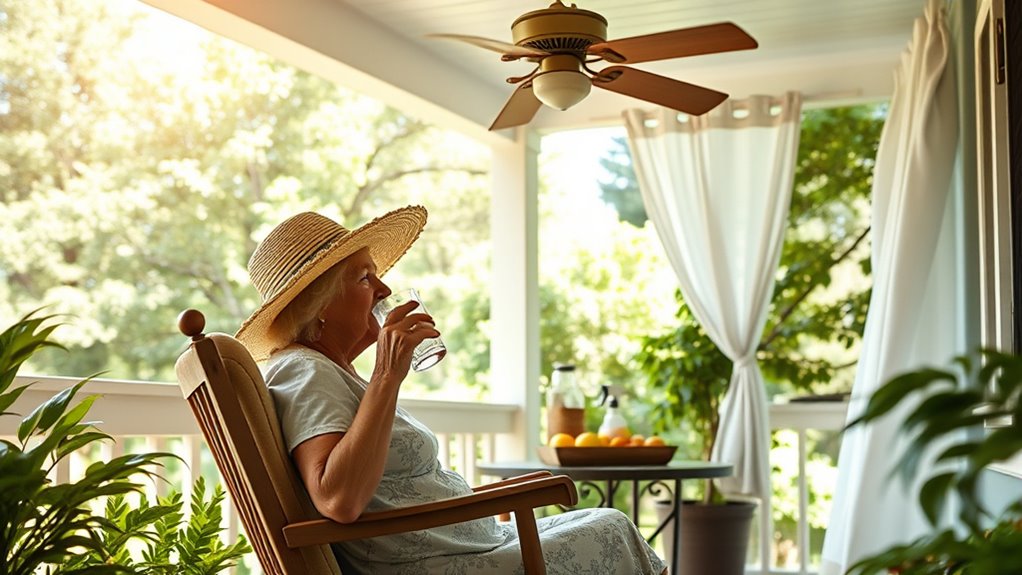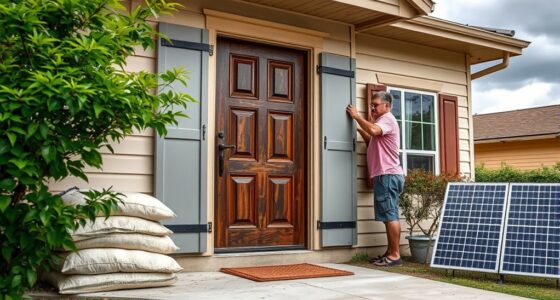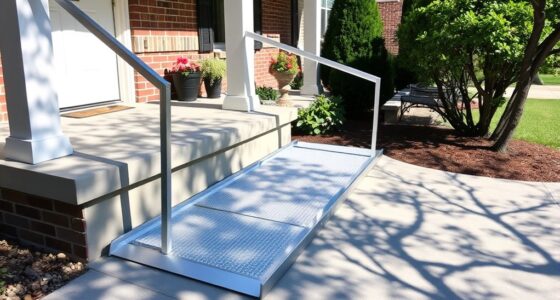To stay safe during hot summer days, you should stay hydrated by drinking water regularly and eating water-rich foods like watermelon. Keep your home cool by using fans, opening windows for cross ventilation, and closing blinds during peak heat. Schedule outdoor activities for early mornings or late evenings, wear lightweight, light-colored clothing, and watch for signs of heat exhaustion or dehydration. Checking on loved ones and having emergency supplies ready can also make a difference. Learn more tips to keep safe all season long.
Key Takeaways
- Keep indoor environments cool and well-ventilated using fans, cross ventilation, and air conditioning maintenance.
- Stay hydrated by drinking water regularly and consuming water-rich foods, avoiding alcohol and caffeine.
- Wear lightweight, light-colored, breathable clothing and apply sunscreen before outdoor activities.
- Schedule outdoor activities during cooler parts of the day, like early mornings or late afternoons.
- Monitor for signs of heat-related illnesses and check on vulnerable neighbors and loved ones regularly.
Stay Hydrated Throughout the Day
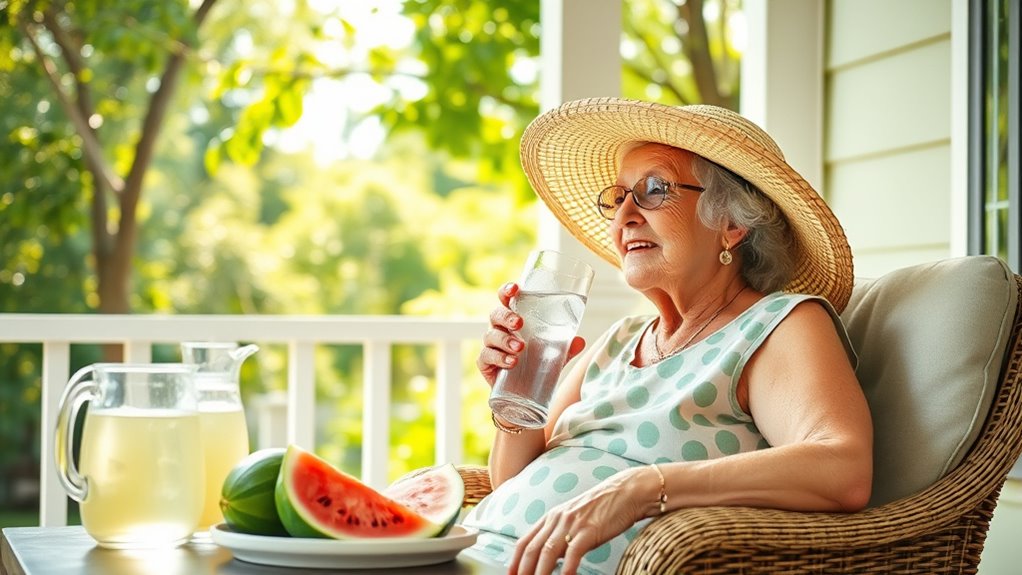
Staying hydrated is essential during hot weather, especially for older adults. To maintain proper hydration, drink water regularly and pay attention to hydration reminders. Incorporate water-rich foods into your diet, such as watermelon, cucumbers, oranges, and strawberries, which help boost fluid intake naturally. These foods can be invigorating and easy to include in your meals or snacks. Remember, thirst isn’t always a reliable indicator of dehydration, so stay proactive about drinking fluids throughout the day. Keep a water bottle nearby and set reminders if needed. Proper hydration keeps your body functioning efficiently, prevents heat-related illnesses, and helps you feel comfortable during the warmer months. Additionally, understanding the importance of color accuracy in visual displays can help you better assess the quality of your environment and ensure optimal comfort indoors. Being aware of emerging AI security vulnerabilities can also help you stay informed about safety measures to protect your health and wellbeing in an increasingly digital world. Incorporating hydration monitoring devices may further assist in maintaining optimal fluid levels and avoiding dehydration risks. Regularly checking your hydration status with smart health devices can provide added peace of mind and help you stay on top of your hydration goals.
Keep Your Living Space Cool and Well-Ventilated
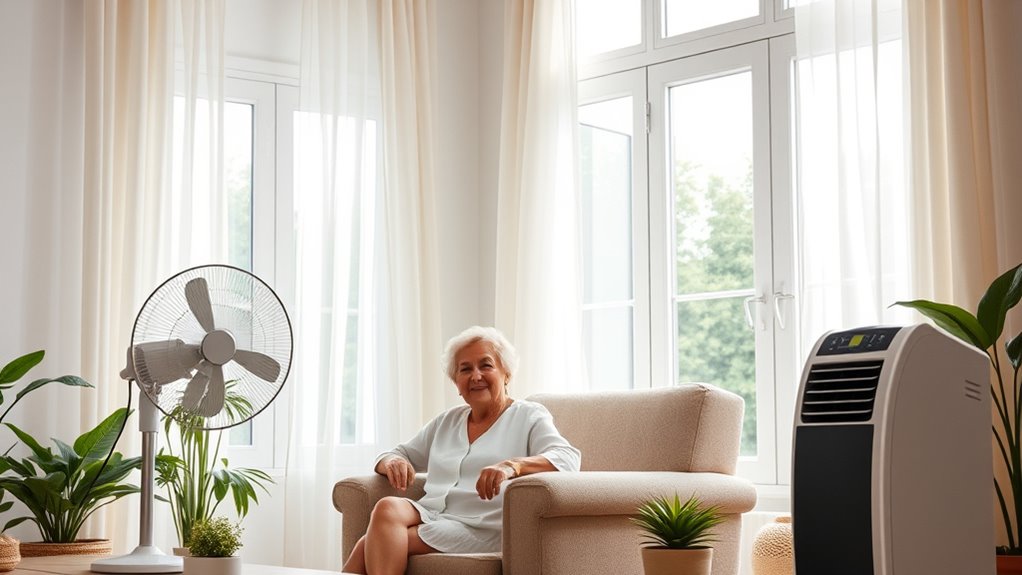
Keeping your living space cool and well-ventilated is key to staying comfortable and safe during hot weather. Managing indoor humidity helps prevent stuffiness and reduces heat buildup. Use cross ventilation by opening windows on opposite sides of your home to create a breeze that cools the air naturally. This not only lowers indoor temperatures but also improves airflow, making your space feel fresher. Keep curtains or blinds closed during the hottest part of the day to block out direct sunlight and minimize heat gain. If possible, use lightweight, breathable fabrics for curtains and bedding. Proper ventilation and humidity control help prevent heat exhaustion and keep your environment comfortable without relying solely on air conditioning. Incorporating natural ventilation techniques can enhance airflow and further reduce indoor temperatures. Being aware of heat-related health risks is essential for safeguarding your well-being during extreme temperatures. Additionally, choosing appropriate cooling methods can further improve comfort and safety during heatwaves. Understanding proper home insulation can also help maintain cooler indoor temperatures and reduce energy costs. Regularly maintaining fans and ensuring vents are unobstructed can also support effective air circulation and improve overall indoor comfort.
Use Fans and Air Conditioning Effectively
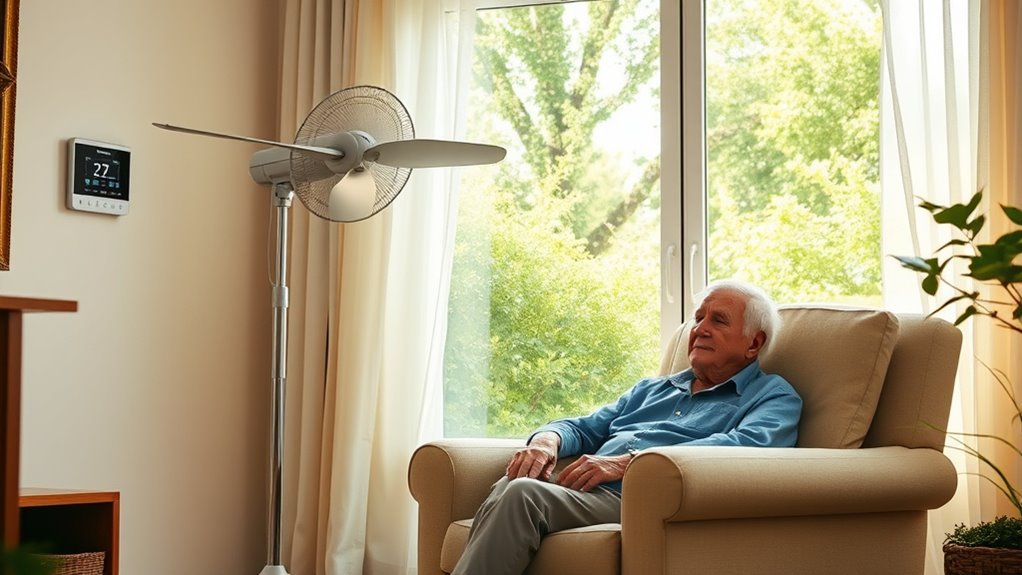
To stay comfortable and safe during hot weather, it’s important to use fans and air conditioning effectively. Proper fan placement guarantees better airflow, so position fans near open windows or doorways to circulate cool air throughout your space. Regular air conditioning maintenance keeps your unit running efficiently and prevents breakdowns during heatwaves.
Here are three tips to maximize their effectiveness:
- Place fans strategically to enhance airflow and avoid stagnant air.
- Keep your air conditioner filters clean and schedule regular maintenance.
- Use ceiling fans or portable fans to supplement air conditioning and improve cooling.
Schedule Outdoor Activities During Cooler Hours
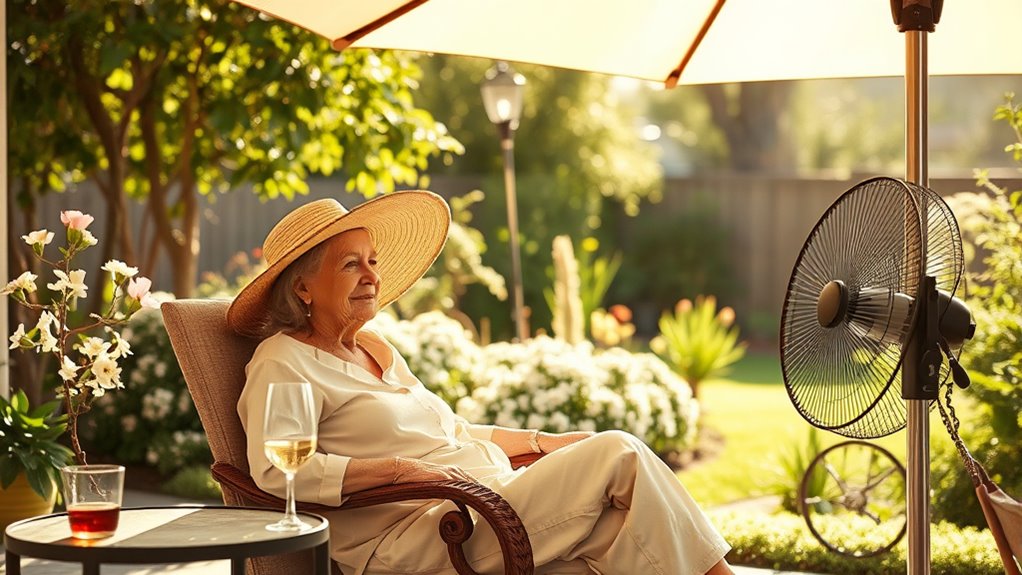
Schedule your outdoor activities for early mornings when it’s cooler and the sun isn’t at its peak. This helps you stay comfortable and reduces the risk of heat exhaustion. Avoid the hottest part of the day to keep yourself safe and energized. For added convenience, consider checking local retail hours to ensure your errands and outdoor visits align with cooler times. Additionally, monitoring weather forecasts can help you better plan your outings to avoid unexpected heat waves. Incorporating community engagement by sharing heat safety tips with neighbors can also enhance overall safety during hot weather. Being aware of shelf life of beverages can help you store drinks properly and stay hydrated during outdoor activities.
Plan Morning Walks
Since outdoor temperatures tend to be cooler in the morning, scheduling your walks during these hours can markedly reduce heat-related risks. Establishing a morning walk routine helps you stay active safely. By planning your early exercise scheduling, you can enjoy the benefits of fresh air without overexposing yourself to heat. Consider these tips:
- Choose a consistent time, like right after sunrise, for your walks to build a habit.
- Dress in lightweight, breathable clothing to stay comfortable.
- Carry water and take short breaks if needed, ensuring you stay hydrated and avoid overheating.
- Incorporate home safety measures such as keeping pathways clear to prevent trips and falls during early morning hours.
Focusing on morning walk routines allows you to enjoy outdoor activity while minimizing heat exposure. Making this adjustment helps keep you safe and energized during hot summer days.
Avoid Peak Sunlight
Scheduling outdoor activities during cooler hours, such as early mornings or late afternoons, helps you avoid the intense heat of midday sunlight. This approach reduces the risk of heat exhaustion and minimizes the need for indoor cooling. When you plan outdoor time wisely, you protect your skin with sun protection measures like hats and sunscreen. Incorporating outdoor activity planning can further enhance safety and comfort during hot weather. Using appropriate attire like lightweight, breathable fabrics can also help prevent overheating during outdoor activities. Additionally, staying hydrated throughout the day is essential for maintaining your health and preventing heat-related issues. Being aware of heat safety guidelines can provide extra protection when spending time outdoors in summer. Moreover, being mindful of weather alerts can help you adjust your plans in case of sudden heatwaves or extreme temperatures.
Wear Lightweight, Light-Colored Clothing

Wearing lightweight, light-colored clothing helps keep your body cooler during hot weather. These choices improve clothing comfort and fabric breathability, essential for staying cool. To achieve this, consider:
Wearing lightweight, light-colored clothing keeps you cooler and more comfortable in hot weather.
- Choose loose-fitting shirts and pants made from breathable fabrics like cotton or linen.
- Opt for light colors such as white, beige, or pastel shades that reflect sunlight rather than absorb it.
- Avoid dark, heavy materials that trap heat and make you feel hotter.
These clothing tips help your body release heat more efficiently and reduce sweat buildup. Lightweight, light-colored clothing is a simple yet effective way to stay comfortable and safe during the summer heat, especially when staying at home. Always prioritize clothing that feels good and keeps you cool.
Protect Your Skin With Sunscreen and Shade

Protecting your skin is essential during hot days. Make sure to apply broad-spectrum sunscreen before going outside and seek shade during peak hours to avoid overexposure. These simple steps can help keep your skin safe and cool.
Apply Broad-Spectrum Sunscreen
To safeguard your skin from the sun’s harmful rays, applying broad-spectrum sunscreen is essential. Proper sunscreen application ensures you get effective UV protection and reduces the risk of sunburn and skin damage. When you apply sunscreen, keep these tips in mind:
- Cover all exposed skin generously, including ears, neck, and hands.
- Use a broad-spectrum sunscreen with at least SPF 30, and reapply every two hours or after sweating or swimming.
- Don’t forget areas like your temples and the back of your neck, which are often overlooked.
Seek Shade During Peak Hours
During the hottest parts of the day, typically between 10 a.m. and 4 p.m., seeking shade is one of the most effective ways to prevent sunburn and skin damage. Find a shade refuge, like an umbrella, tree, or covered porch, to keep your skin protected from direct sunlight. Staying in the shade reduces your exposure to harmful UV rays and provides essential sun protection. If you’re outdoors, take breaks in shaded areas regularly, especially during peak hours. Wearing a wide-brimmed hat and lightweight clothing also helps, but shade offers immediate relief. Remember, minimizing sun exposure during these hours is key to safeguarding your skin and avoiding heat-related issues. Prioritize shade refuge to stay safe and comfortable in the summer heat.
Recognize the Signs of Heat-Related Illnesses
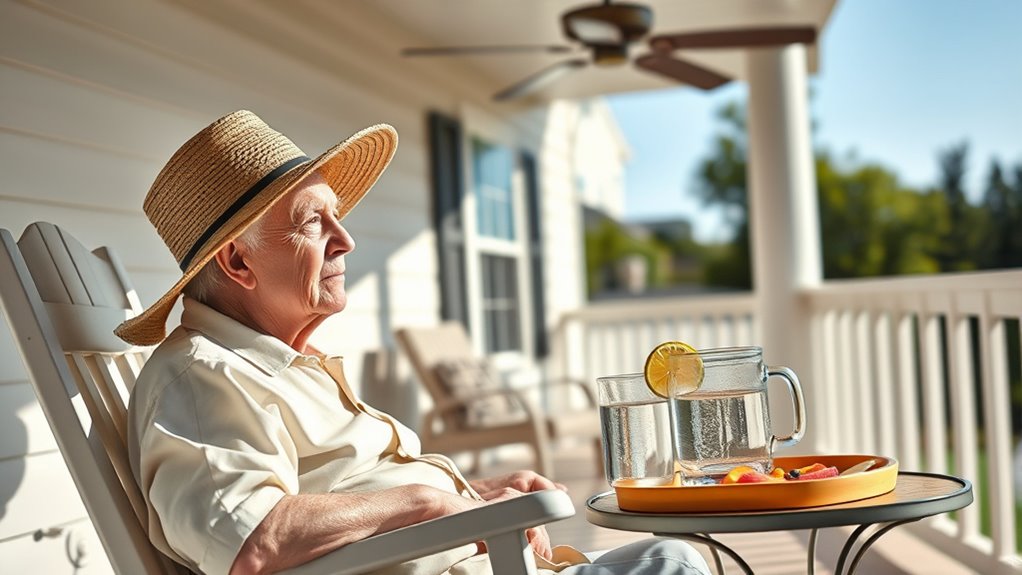
Heat-related illnesses can develop quickly, especially in older adults, so it is essential to recognize the early warning signs. Being alert can prevent serious health issues. Watch for:
- Signs of heat exhaustion, such as heavy sweating, weakness, and dizziness.
- Symptoms of dehydration, like dry mouth, dark urine, and feeling extremely thirsty.
- Other warning signs include nausea, headache, and muscle cramps.
If you notice any of these, move to a cooler place, hydrate with water, and rest. Ignoring these signs can lead to heat stroke, which is life-threatening. Stay vigilant and act promptly to keep yourself safe during hot weather. Recognizing these symptoms early is key to preventing severe health problems.
Avoid Alcohol and Caffeine During Hot Days
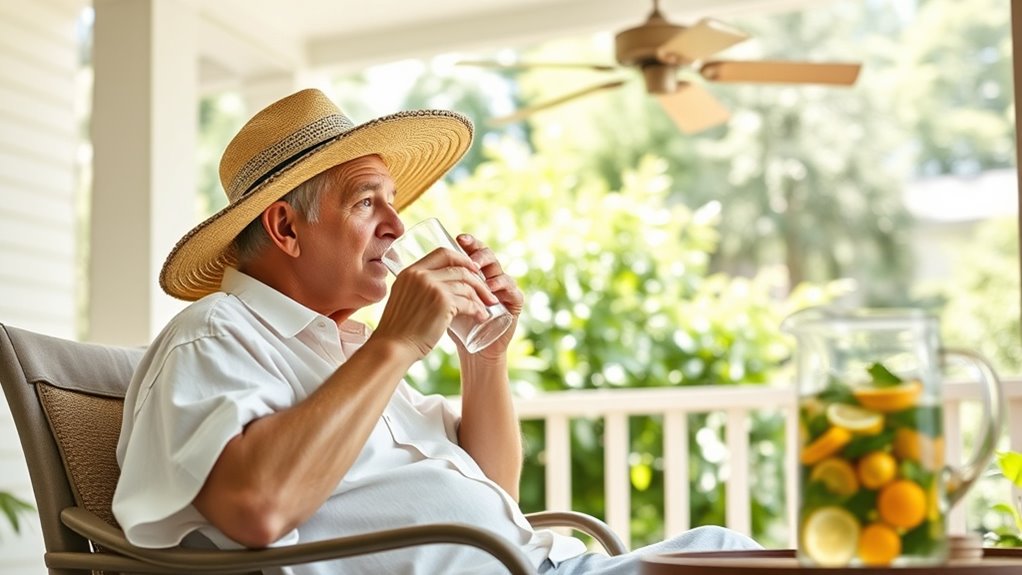
Drinking alcohol and caffeine can lead to dehydration, which worsens your body’s ability to stay cool. When you’re dehydrated, your health risks increase, especially during hot days. To stay safe, stick to water and avoid beverages that can drain your fluids.
Hydration Impact on Health
To stay properly hydrated in hot weather, it’s necessary to avoid alcohol and caffeine, as these substances can dehydrate your body further. They disrupt electrolyte balance and impair thirst regulation, making it harder to recognize when you need fluids. To keep your hydration levels ideal:
- Drink plenty of water throughout the day to support electrolyte balance.
- Consume hydrating foods like fruits and vegetables with high water content.
- Limit beverages that cause dehydration, such as alcohol and caffeinated drinks.
Dehydration Risks Increase
During hot days, consuming alcohol or caffeine can considerably increase your risk of dehydration. Both beverages act as diuretics, which means they cause your body to lose more water and disrupt your electrolyte balance. This imbalance makes it harder for your body to stay cool and maintain proper hydration levels. To prevent dehydration, focus on increasing your water consumption throughout the day. Avoid drinks with caffeine or alcohol, as they can dehydrate you further. Instead, opt for water, electrolyte drinks, or flavored water to replenish lost minerals and support your body’s natural cooling process. Staying well-hydrated helps your body regulate temperature and reduces the risk of heat-related illnesses. Remember, consistent water intake is essential, especially during hot weather.
Check in on Family, Friends, and Neighbors
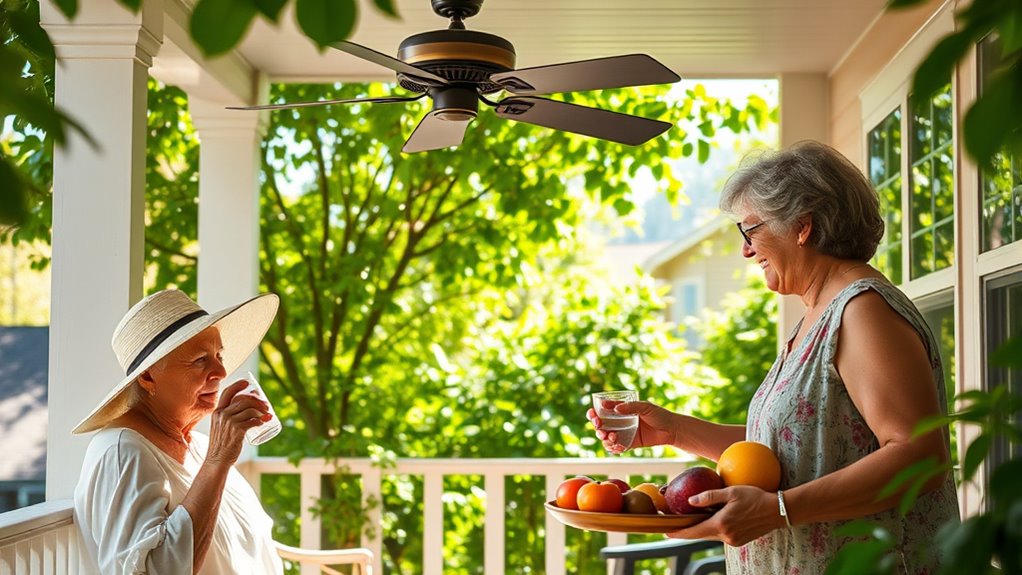
Since extreme heat can quickly become dangerous, it’s important to check in regularly on your family, friends, and neighbors, especially older adults who may be more vulnerable. Your efforts foster community outreach and strengthen social connection, helping everyone stay safe.
Consider these actions:
- Call or visit to ask how they’re feeling and if they need help with errands or cooling measures.
- Encourage them to stay indoors during peak heat hours and remind them to hydrate.
- Share information about local cooling centers or resources available in your community.
Keep Emergency Supplies Handy
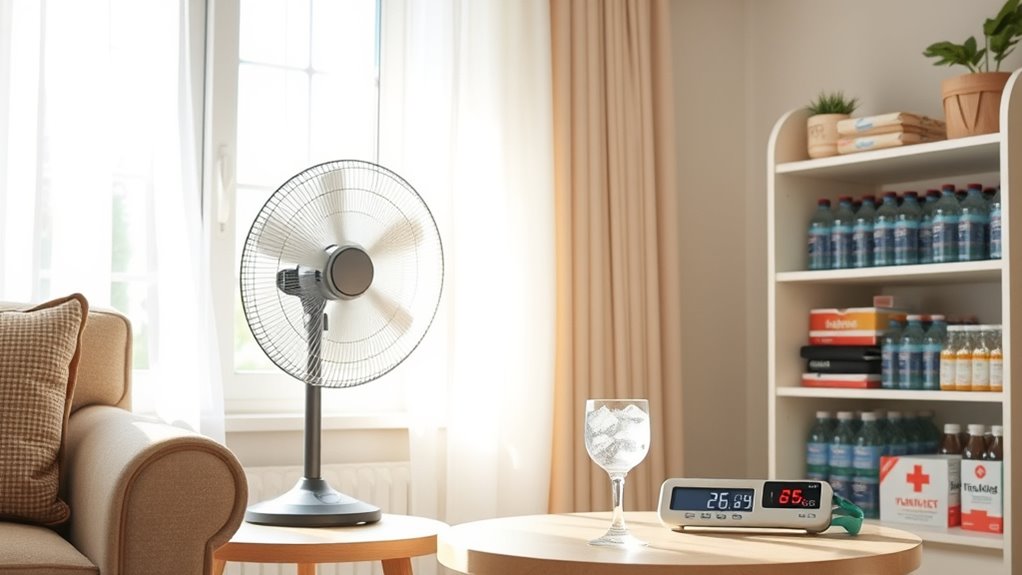
Checking in on loved ones helps make certain they’re managing the heat, but it’s also important to be prepared yourself. Emergency preparedness means keeping an accessible supply checklist of essentials in case of power outages or extreme heat. Make sure you have enough bottled water, non-perishable food, and medications. Include a flashlight, batteries, and a battery-powered radio to stay informed. Keep a first aid kit nearby, along with any necessary medical supplies. Store these items in a designated, easy-to-reach spot so you can quickly grab them if needed. Regularly check expiration dates and replenish supplies. Being proactive ensures you’re ready to handle unexpected heat-related emergencies, keeping you safe and comfortable during the hottest days.
Frequently Asked Questions
How Can I Tell if I’M Experiencing Heat Exhaustion or Heat Stroke?
To recognize symptoms of heat exhaustion or heat stroke, pay attention to how you’re feeling. Heat exhaustion causes heavy sweating, weakness, and dizziness, while heat stroke is more severe, with symptoms like confusion, rapid heartbeat, and a high body temperature. If you notice these signs, act quickly by moving to a cool place, hydrating, and seeking emergency response if symptoms worsen. Recognizing symptoms promptly can prevent serious health risks.
Are There Specific Foods That Help Keep Me Hydrated During Hot Days?
To stay hydrated during hot days, you should focus on foods with high water content, like watermelon, oranges, and strawberries, which help keep you refreshed. Additionally, herbal hydration drinks can boost your fluid intake without added sugar. Incorporate these into your meals and snacks to maintain hydration, especially when it’s hot outside. Staying consistent with these foods makes a big difference in keeping your body cool and healthy.
What Are the Safest Ways to Cool Down if I Don’T Have Air Conditioning?
If you don’t have air conditioning, you can stay cool by creating DIY fans using materials like cardboard and paper to circulate air. Use shade strategies, such as closing blinds or curtains during the hottest parts of the day, to block out heat. Staying in cooler parts of your home, taking cool showers, and drinking plenty of water also help you avoid overheating. These simple steps keep you safe and comfortable.
How Often Should I Check My Indoor Temperature During a Heatwave?
Think of indoor monitoring as your home’s heartbeat during a heatwave. You should check your indoor temperature at least every two hours, especially if it’s hot outside. Keep an eye on temperature thresholds—if it rises above 78°F, take action to cool your space. Staying vigilant helps prevent overheating, just like a nurse checks essential signs regularly to ensure health and safety.
Can Certain Medications Increase My Risk of Heat-Related Illnesses?
Certain medications can increase your risk of heat-related illnesses through medication interactions and dehydration risks. If you’re taking diuretics, antihistamines, or blood pressure drugs, you might become dehydrated more easily or have impaired heat regulation. Always talk to your doctor about how your medications may affect you during hot weather. Stay well-hydrated, avoid direct sunlight, and monitor your symptoms closely to prevent heat exhaustion or stroke.
Conclusion
As summer’s heat swells like an unstoppable tide, you hold the lighthouse of safety within. By staying hydrated, keeping your home cool, and watching for warning signs, you steer clear of dangerous storms. Remember to check on loved ones and keep emergency supplies nearby, your guiding stars. With these precautions, you’ll navigate the season’s fiery path safely, emerging into the calm of cooler days, knowing you’ve built a fortress of protection against the relentless summer sun.
